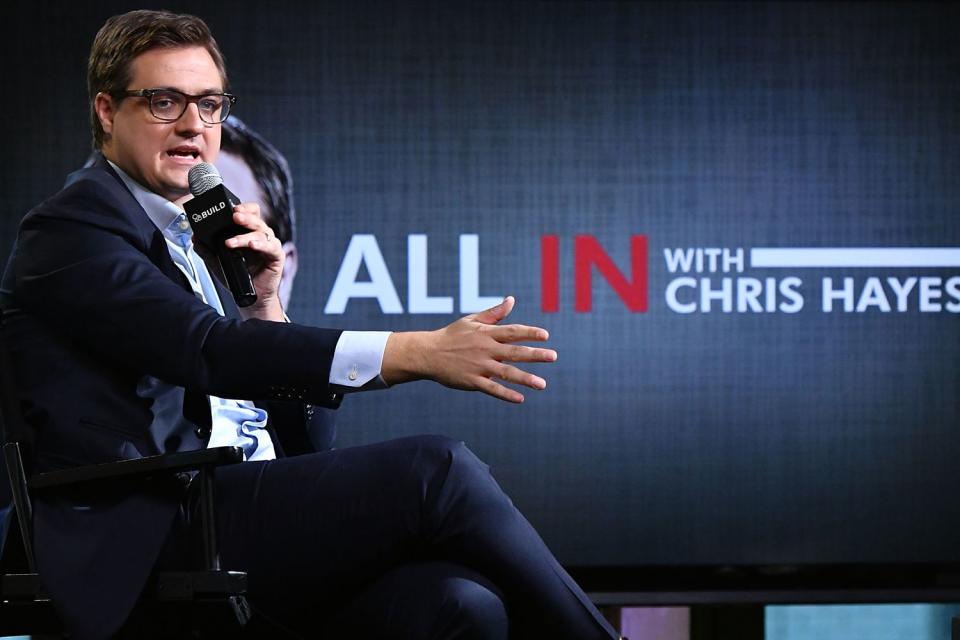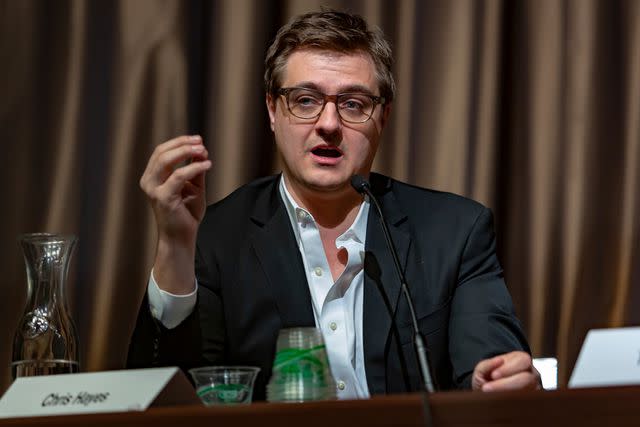How MSNBC's Chris Hayes Pulled Himself Out of 'Fight-or-Flight Mode' After 10 Years on Primetime (Exclusive)
- Oops!Something went wrong.Please try again later.
- Oops!Something went wrong.Please try again later.
In a decade that challenged journalists with countless historic moments, Hayes figured out a way to stay calm. Now, he tells PEOPLE, "I still get the excitement, but I don't get the biological response"

Chris Hayes is the first to acknowledge that a lot can happen during a decade in the news business. But 10 years into hosting his eponymous MSNBC show, and three years after the start of a pandemic that changed everything, he says very little surprises him anymore.
"Anyone who has been in this line of work [knows the feeling]. Between Trump, COVID and Jan. 6, at this point, it's like anything could happen," Hayes, 44, tells PEOPLE with a laugh. "If I heard a meteor hit Earth, it would be like, 'Right. Sure.'"
Hayes began his television career as a guest host of The Rachel Maddow Show and other MSNBC programs before landing his own weekend show, Up with Chris Hayes, in 2011. In March 2013, he moved to primetime as the host of the weekday news and opinion show All In with Chris Hayes.
Related:Alex Wagner Is 'Upside Down with Excitement' to Host Rachel Maddow's MSNBC Time Slot 4 Nights a Week

At the time, a 33-year-old Hayes was the youngest host of a primetime show on any major cable news channel in the U.S. — and he admits that the new role came with a steep learning curve.
"The first three or four years, I think I was in fight-or-flight mode every waking moment," Hayes says. "I think my heartbeats-per-minute and cortisol levels were through the roof at all times — it felt like I was in a cage with a wild animal."
Eventually, he says, he's gotten used to processing headlines and responding to them in real time, and taking care of himself during off-hours to properly recharge.
"What I've learned is to try and get sleep, work out four days a week, walk and get sunshine. And the other big thing is spending time with my kids," he says. That routine is somewhat new for Hayes, and a direct result of the pandemic allowing for more remote work opportunities.
"Before, I would see the kids in the morning and it was chaotic — get your shoes on, brush your teeth drag, them out to school," he says. "And then I would come home at 10, they'd be in bed and I wouldn't see them until the next morning."
He continues: "Now, post-COVID, I do a lot of my work remotely and go in late in the day to do the show. So I can run someone to softball practice. I can take 20 minutes to cuddle my 5-year-old on the couch."
The added time with family also means new traditions, like homemade pasta-making on the weekends.
Related:Rachel Maddow Reveals Nightly MSNBC Talk Show Will Move to Weekly Format

Hayes, a Bronx native, grew up going to his grandfather's Italian deli in New York City and was "really immersed" in the Italian-American culture of his mom's side of the family.
"We would go to this place called Borgatti's on Arthur Avenue for fresh pasta ... I started making it myself during the pandemic. If we have a Saturday or Sunday free, I find it incredibly soothing."
The self-soothing traditions are increasingly important for Hayes, who juggles his show, his weekly podcast Why Is This Happening?, family life and the daily grind of reporting the news.
And while he still finds journalism to be just as exciting as it was a decade ago, he says he's learned to manage the reporting side of things.
"I still get the excitement, but I don't get the biological response," he muses. "One thing I've learned about television is that a huge component is practice — training your body to be in a resting position even if you're performing."
He continues: "Think about David Letterman and Oprah. I guarantee if you take their pulse, it's the same on-air and off-air. That comes from experience and craft — and talent. I know that my resting heartbeat, even amid chaotic breaking news is so much lower now than it was in the beginning. And that's better for the viewer. The viewer senses tension."
That he can manage the stress better has been especially crucial in recent years, which have seen some of the biggest history-making moments in modern journalism.
Asked about the moments he remembers most clearly from his time behind the news desk, Hayes says the 2016 election as a whole sticks out.
"I remember election night 2016, being in our studio room with [former RNC chairman] Michael Steele and [Democratic strategist] James Carville and it sort of dawned on me first [that Trump] would win the election," he recounts.
And then there was the time period, years later, when Hayes found himself going to work in a ghost town amid the COVID-19 pandemic.
"I remember this one week that I spent after the world had shut down when I was still going to [the Manhattan MSNBC studios at] 30 Rock before we could figure out a remote studio," he says. "That week, going into ghost town Manhattan and the ambulances, and the masks, and washing my hands constantly, and very few people were left in the building. It was this weird, ghost apocalypse building. There's a desk in our bullpen area with a half-drunk cup of coffee, like someone had just left so quickly they couldn't finish it."
Never miss a story — sign up for PEOPLE's free daily newsletter to stay up-to-date on the best of what PEOPLE has to offer.
The era of pandemic reporting was, as Hayes acknowledges, complicated — though he was able to lean a bit on his dad, who works in public health.
"The pandemic was so interesting [as a journalist] because it was a whole set of new intellectual muscles I was using," Hayes says.
He continues: "The thing that I enjoy the most — the thing that I think that I am best at — is reading a lot, synthesizing a lot of information and communicating it. And sometimes, there's an entire world of information to synthesize and the stakes of doing it are very high. That's when the work feels vital and important."
For more People news, make sure to sign up for our newsletter!
Read the original article on People.

